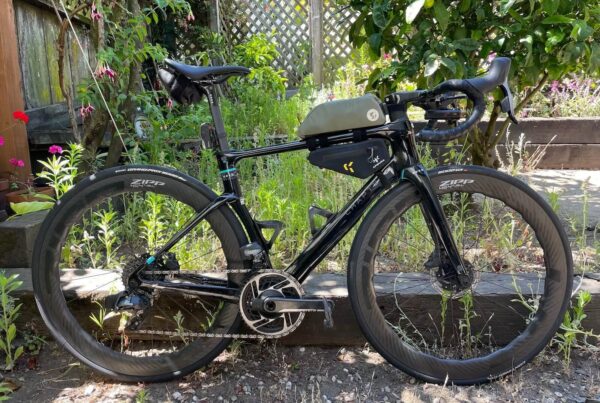By Bob Mionske
Eight years ago, representative Earl Blumenauer had an idea—if the law allows employers to offer tax-free fringe benefits to subsidize their employees who commute by car, or by transit, shouldn’t the law also offer those kinds of benefits to cyclists?
Was Blumenauer the first to think about this? I don’t know. But because he’s a Congressman (representing Portland, Oregon), he was in a position to do something about it. They say that the average length of time it takes new legislation to pass is seven years; as if in evidence of that, it took Representative Blumenauer the next seven years to get the Bicycle Commuter Act passed.
In the most memorable incident arising from previous attempts to pass the legislation, when the Bicycle Commuter Act was included as a part of Renewable Energy and Energy Conservation Tax Bill of 2007, Representative Patrick McHenry ridiculed the proposed legislation from the floor of the House:
“A major component of the Democrats’ energy legislation and the Democrats’ answer to our energy crisis is, hold on, wait one minute, wait one minute, it is promoting the use of the bicycle.(Oh, I cannot make this stuff up. Yes, the American people have heard this. Their answer to our fuel crisis, the crisis at the pumps, is: Ride a bike.(Democrats believe that using taxpayer funds in this bill to the tune of $1 million a year should be devoted to the principle of: “Save energy, ride a bike.” Some might argue that depending on bicycles to solve our energy crisis is naive, perhaps ridiculous. Some might even say Congress should use this energy legislation to create new energy, bring new nuclear power plants on line, use clean coal technology, energy exploration, but no, no. They want to tell the American people, stop driving, ride a bike. This is absolutely amazing. Apparently, the Democrats believe that the miracle on two wheels that we know as a bicycle will end our dependence on foreign oil. I cannot make this stuff up. It is absolutely amazing.((
Ladies and gentlemen, I bring you the Democrats, promoting 19th century solutions to 21st century problems. If you don’t like it, ride a bike. If you don’t like the price at the pumps, ride a bike.((Stay tuned for the next big idea for the Democrats: Improving energy efficiency by the horse and buggy.”
The Bicycle Commuter Act did not pass in 2007, but Rep. Blumenauer continued to persevere, and it did pass in October of 2008, when it was attached in the Senate to the financial rescue package. The Bicycle Commuter Act became effective in the tax year beginning January 1, 2009.
So how does the tax benefit work? Basically, it allows your employer to offer you $20 per month, untaxed, as a fringe benefit to your employment. Employers already offer these types of fringe benefits to their commuters to help offset parking or transit costs; the Bicycle Commuter Act simply allows employers to extend a similar fringe benefit to their employees who commute by bike. As with those other fringe benefits, the bicycle commuter benefit is intended to be used to offset the costs of commuting.
For cyclists, that means that you can use the money to offset your commuting-related purchases, such as a bicycle, or tires, or accessories such as helmets, locks, or clothing. You can also use it to offset the cost of paying for services, such as parking facilities, shower facilities (for example, if you pay fees to a health club to use the shower before you arrive at your office), and maintenance.
Of course, $20 doesn’t go far these days. The benefit, as originally conceived by Rep. Blumenauer, was supposed to be $80 per month, which is still below the $120 that transit commuters receive monthly, and even further below the $230 monthly benefit commuters receive to offset parking costs. However, there was political opposition to that $80 figure, so it was trimmed down to $20 per month in order to gain support in Congress.
That opposition may have evaporated following the November election. Just 3 months after the new tax benefit took effect, Rep. Blumenauer surprised the National Bike Summit when he announced that he has introduced legislation (H.R. 863) that will allow employees to combine cycling and transit benefits in any month, with a total monthly benefit equal to the monthly transit benefit of $120. The intent of the legislation—called the Multimodal Commuter Credit—is to provide more flexibility to bike commuters, by allowing them to take transit on some days, and ride on other days, or to combine bicycle and transit modes on the same commute.
So what’s in it for employers who provide this benefit? According to the League of American Bicyclists,
Employers sensitive to tax savings, employee morale, improved recruitment and reduced turnover are prominent fringe benefit providers. They have found that it enhances their benefits package without increasing overall compensation costs. Employers reduce FICA and other payroll-related costs to subsidize employee commuting costs.
OK, so the bicycle commuter tax sounds interesting to you—how do you go about claiming this benefit? Well, that’s an interesting question. Because it’s a fringe benefit of employment, it’s something that your employer would have to offer you. The League of American Bicyclists suggests one method that helps employers interested in providing this benefit to their employees:
Accor Services, a leading provider of transportation benefits commuter solutions in the United States, has developed a new program, the commuter check solution for bicycle commuters.
Commuter Check for Bicycling™ vouchers are the most convenient solution available to take advantage of the $20 per month Bicycle Benefit, authorized by the IRS to begin January 1, 2009. Commuter Check for Bicycling vouchers are available through Accor Services’ Commuter Check Office online ordering platform. Employers purchase them just like they do standard Commuter Check vouchers. They offer the same security and terms of use as standard Commuter Checks. Employees can take the vouchers they receive to any dedicated bicycle shop or bicycle parking or storage location to redeem their value. Interested employers and employees can visit the Accor Services website here, to get more information and sign up for the program.
Another way to provide the benefit would be for the employer to directly reimburse the commuting employee for up to $20 per month in bicycle-related commuting expenses. As the League explains,
The key point to consider in setting up a cash reimbursement program is that there is a mechanism for the employee to certify that they will commute to work by bike a substantial portion of the month… Additionally, that there is a bona fide reimbursement arrangement whereby the employee provides receipts for covered expenses incurred such as, bike maintenance, commuting gear, parking facilities, changing or shower facilities etc…
There are two main qualifications defining who is eligible to receive the benefit. One of the qualifications is that the bicycle commuter can’t also be receiving a transit or parking benefit. The other is that the bicycle commuter “regularly uses the bicycle for a substantial portion of the travel between the employee’s residence and the place of employment.” In case you don’t know what the statute means by “regularly uses” or “substantial portion,” join the crowd. The legislation doesn’t define those terms, and so far, the IRS hasn’t defined them either. About the only thing we can gather from those two qualifications is that, because the bicycle commuter isn’t receiving a transit or parking benefit during the same month that s/he is receiving the bicycle commuter benefit, s/he is probably not driving or using transit much to get to work. This raises another point—it’s not necessary for you to ride year-round to claim the benefit. You could, for example, commute by bicycle from May through September, and claim a bicycle commuter benefit during those months, and claim either a parking or transit benefit during those months when you are not commuting by bike.
As the League of American Bicyclists notes, the bicycle commuter benefit is a modest one. Nevertheless, if it proves popular, as the League expects it will—or if the House passes Blumenauer’s new legislation—we’ll have a modest first step towards a more equitable fringe benefit.
(Research and drafting provided by Rick Bernardi, J.D.)
This article, The Commuter Tax Benefit, was originally published on Bicycling on March 19, 2009.



